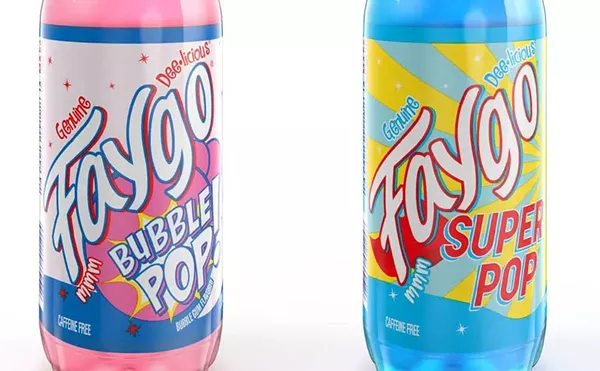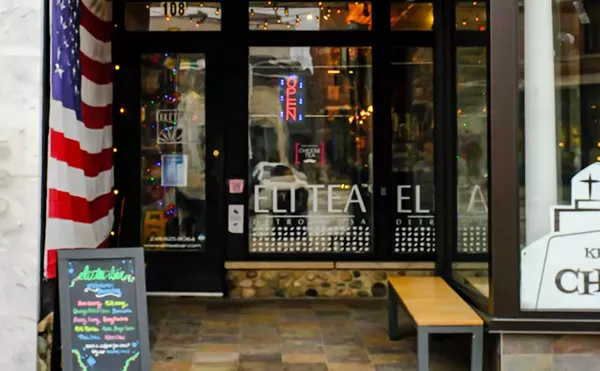Opened Oct. 20, the Mercury Coffee Bar is quickly on its way to neighborhood institution status in Corktown, across from Slows Bar BQ and a stone's throw from what's left of Michigan Central Station. Specializing in "slow coffee," salads and sandwiches, the place has a backstory:
Majority owner Todd Wickstrom served on the Michigan Food Policy Council, on a task force assigned to find out why, as he tells it, "in cities like Detroit, it's easier to find a handgun than a head of lettuce." He decided he wanted to be "part of the solution ... to go into a community to make long-term change." (He lives in Ann Arbor and commutes daily.)
After looking at grocery stores and food-processing businesses, Wickstrom determined that "the best way to make change was through retail — partly to create good jobs, not necessarily to tell people they were eating the wrong foods."
On each of my four visits, the Mercury clientele was all-white, mostly young hipsters, thrilled to find a good cup of coffee but quite capable of finding their way to Eastern Market for a head of iceberg or romaine. The large staff is almost all-white as well.* I'd asked Wickstrom, before the opening, about a possible mismatch: his desire to bring good food to Detroit and the fact that most Detroiters aren't familiar or comfortable with the types of foods he'd be offering — black olive tapenade, sopressata, goat cheese, jasmine silver needle tea. "But as soon as they taste it, they'll like it," he said.
Yes, but first you have to get them in the door.
Wickstrom determined that, unfortunately, many Detroit neighborhoods are too sparsely populated to support such a restaurant. The southwest side — far browner and whiter than black — is one of the few growing areas of the city. If young white hipsters were an underserved population before the Mercury opened, no more.
If this sounds hypercritical, consider that when you assert admirable ideals, you've got to be open to evaluation of whether your hard work is going in the right direction. But let's assess the menu in light of the audience it's attracted thus far. They oughta love it.
On my first visit I fell in love with the Mercury's soups. If cabbage could go uptown, the Irish colcannon soup would be the result: rich and substantial and strong. Like the butternut, which is thick and velvety, nurturing, more interesting than sweet, it's the essence of fall.
Salads are also nicely conceived, and offering a small for $3 is an excellent idea. Two out of three are made with the oft-mocked arugula, which I'm partial to; here, it's not bitter but just tart, served with a light lemon vinaigrette. One salad uses exceptional bacon with Parmesan; another makes the traditional Michigan salad (cherries, apples) tastier by replacing walnuts with pine nuts. The spinach salad with beets and goat cheese is less successful (though that's nothing against beets — hail Dwight!).
One of the Mercury's prominent bragging points is its slow coffee, with each cup individually ground and brewed. (Espresso and "fast coffee" are also possible.) When my companion asked the counterman for a recommendation, the first question was whether he'd be drinking it black. For black coffee, "the Kenya" was suggested, as it is "bright, fruity, syrupy." The Mercury will have a liquor license soon, so perhaps the guy was anticipating explication of the wine list.
In the cup, the Kenya was indeed excellent, though neither fruity nor syrupy. As my friend said, "it has a lot of detail to it. You taste the whole coffee, the whole process." In other words, it's complex, which is a great thing for a coffee (or a wine) to be. Espresso was tart and sharp with a rich crema, the orange foam that floats on the surface. Every day, you can choose one of three single-source slow brews or have your espresso turned into cappuccino, etc.
Sandwiches and panini on Avalon bread are delicious and creative, although they could use more inside; the meats are a condiment rather than a main ingredient. Only cured meats are used, ham and several salamis. Spicy sopressata, for example, is teamed with sweet grilled onions and mild fontina for a good set of contrasts. Country ham and cheddar are topped with peach relish; I could have used more of all three. Both a pesto panino, made with a mellow, not-very-garlicky basil pesto, and a mole salami sandwich with fresh mozzarella are enhanced by sweet, sweet red peppers.
Salt and pepper are served in tiny glass bowls rather than shakers, leaving me to hope that folks aren't using their fingers to sprinkle.
All the extravagant desserts are made in-house, and there are some doozies. Peanut butter pie has a very soft filling, like whipped sweetened peanut butter, with a chocolate layer on the bottom, delicate pastry and chocolate squiggles on top. A pecan bar is so much better than the usual pecan pie, with a rich shortbread crust. Apple pumpkin muffins are autumnal and warm. Key lime pie is both tart and creamy, quite a feat, but the tres leches cake could have been moister (thus the name, tres leches).
Bottom line on the food: The sooner those lettuce-deprived Detroiters learn to love arugula, the better!
The fact that the kitchen is in your face is part of the Mercury's design. It takes up most of the ground floor, with the seating spread along the floor-to-ceiling windows. The idea, says Wickstrom, is to make you feel you've walked into the kitchen, which you have. But it's not a gingham-curtains, kitchen-table kind of kitchen — it's all slabs of stainless steel, and that doesn't feel welcoming. It feels industrial, and loud, despite the assertive friendliness of the staff. Alternative seating is in the basement, which, despite its red brick walls, is still a basement, with the lack of natural light that basements are known for.
One more jab, for a place whose food I love and that I plan to visit often — this is my neighborhood that just got enhanced, after all: The menu uses singular headings rather than plural — "Sandwich," "Salad," rather than Sandwiches, Salads, as if there were only one sandwich on offer (there are five). The only reason I can think of is that this lets the menu writer show that he or she knows that the singular of panini is panino. No harm done.
* Erratum: This sentence has since been disputed. See owner Phil Cooley's letter to the editor.
Jane Slaughter dines for Metro Times. Send comments to [email protected].







